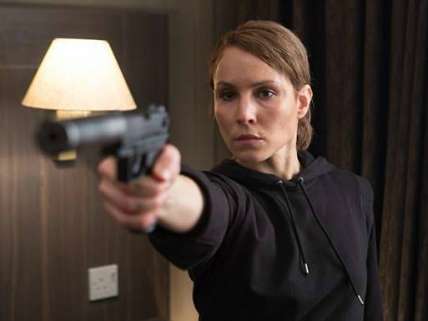Movie Review: Unlocked
Noomi Rapace and Orlando Bloom going through the old Euro-espionage motions.

Imagine the melancholy passage this picture has endured in the three years since it was shot: Left to snooze on a high shelf, occasionally pulled down to be poked and prodded by a team of editors in search of a graceful narrative through-line, or at least a few shapely scenes…all in vain. Finally, defeated, the filmmakers gave up and just put the damn thing out. And here it is.
Unlocked is an international-espionage thriller in the very long line of the Bond and Bourne movies, and I hear you stifling a yawn. But this one's different. Because in this one, the international kickass at the center of things is…a woman. That's right. And that might've sounded sort of bold three years ago, but now it's come a little late—Atomic Blonde kicks this movie's butt all over the lot.
It's not just that dragon-tattoo girl Noomi Rapace is about five inches shorter than Charlize Theron—she's about seven inches shorter than Orlando Bloom, the most action-y of her costars here. And so she never seems in any way formidable—a quality that Theron can summon with just a lopsided lift of her lip.
Rapace plays Alice Racine, a CIA agent who screwed up an op in Paris two years earlier and now, spooked (so to speak), works undercover at a London community center counseling amiable ethnic people about employment opportunities. This could happen, I suppose. Then Alice gets a summons from her old CIA boss, Eric Lasch (Michael Douglas), who wants to bring her back into the action. It seems there's an evil Muslim imam who's about to dispatch a young Moroccan courier to somebody-somebody-whatever and there's a nightmare biological weapon in play and Alice's job, once the Company has snatched the courier, will be to pry out of him the recognition phrases he needs to use with the nightmare-biological-weapon connection. This way a new agency-controlled courier can be introduced into the mix and whatever-whatever.
I imagine the insanely convoluted story here might have made some sense three years ago. Well, maybe. It's a first film script by writer Peter O'Brien, who previously labored in the field of Halo video games; but the chaotic narrative might not be his fault – it's the chaotic editing that works hardest to keep us in the dark.
What keeps us snickering, though, is the movie's pure-Hollywood take on Islamic terrorism. The big bad guy here—a man determined to spread a lethal designer virus in the worst possible place—isn't from the Middle East; he's a wealthy young American ("a trust-fund jihadi," someone calls him, as if that were a thing). And the soulless chemist cooking up the virus in an illicit lab? He's Asian. And that evil imam we met at the beginning? Turns out he's actually a guy who dreams only of peace.
I wonder if any of the other name talent here contemplated such silliness before signing on to this picture. Douglas has a role of some plot relevance; but Toni Collette, as a prickly MI5 officer nibbling at the edges of the plot, and John Malkovich, as a CIA chieftain flown over from Langley to hiss and fret from time to time, are basically wasted. Then there's Orlando Bloom's character, Jack Alcott, a burglar whom Alice interrupts practicing his trade in a luxe apartment. You wouldn't think an on-the-run CIA agent like Alice would have much use for a miscreant like Jack—until you learn that he served in the military, so he's good with weapons, and he lost his best friend in the 2005 London tube bombings, so he doesn't much like frickin' terrorists, either. Also he has a neck full of tattoos and a cute little ponytail, and you can imagine how Alice might fall for him. Unfortunately, she doesn't. (This is a movie in desperate need of sexy. And director Michael Apted—who has an actual Bond movie on his resume: the 1999 The World Is Not Enough—seems to have lost interest in this area.)
A wearisome overload of conspiracies and double-crosses piles up —there's a mole, naturally—and as the movie traipses from tense interrogation room to roaring soccer stadium to darkly muddled riverside shootout, you may feel your interest leaking away; and you may feel it petering out entirely after a bluntly unprepared left turn to Prague. There are some adequate action scenes—some shooting, some chasing, the usual. But Rapace isn't the actor to carry this sort of picture. She's too inward, too buttoned up; and the script gives her none of the breezy flair of the various Bonds or the emotional backstory that redeems the grim-lipped Jason Bourne. She's just a woman in a formerly all-male context. And that alone is no longer enough.


Show Comments (24)